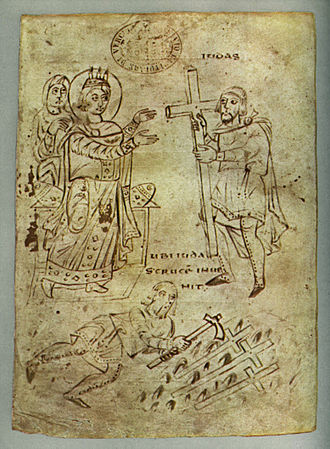The 'ordinary' texts for the Office in July are for time throughout the year (after the Octave of Pentecost).
At Matins on ordinary weekdays, the readings follow the summer pattern of one short reading and short responsory only.
If you would like more detailed notes, you can purchase the full ordo through Lulu in hardcopy or PDF form.
You can also find notes on how to say the Benedictine Office according to the 1962 calendar and rubrics here.
JULY 2023
Saturday 1 July – Class IV; Our Lady on Saturday [EF/In
some monasteries: The Most Precious Blood of Our Lord Jesus Christ, Class I]
1 Vespers of the Fifth Sunday after Pentecost, MD 446*/AM 576-7 & 594.
Sunday 2 July – Fifth
Sunday after Pentecost, Class II; Commemoration of the Visitation of the BVM
Matins: All as in the psalter with
readings and responsories of the Fifth Sunday after Pentecost.
MD 464-5*/AM 594-5; for the commemoration at Lauds, Benedictus
antiphon, versicle, and collect of the Visitation MD [182]/AM 955-6.
Monday 3 July – Class IV; SS Processus and Martinian, Memorial [EF: St Irenaeus, Class III]
For notes on how to say the Octave of SS Peter and Paul see AM 958.
All as in the psalter for throughout the year, collect MD 464-5*/AM 594; for the commemoration at Lauds, MD [184]/AM 956.
Tuesday 4 July – Class IV
[**In some places: St Procopius]
Wednesday 5 July – Class IV [EF: St Anthony Mary Zacharia, Class III]
Thursday 6 July – Class IV [St Maria Goretti, Optional Class III; Gower, Class III; Previously: Octave Day of SS Peter and Paul]
Friday 7 July – Class IV [EF: SS Cyril and Methodius, Class III]
Saturday 8 July – Class IV; Saturday of Our Lady [EF: St Elizabeth of Portugal, Class III]
1 Vespers of the Sixth Sunday after Pentecost, MD 447*/AM 577 & 596.
Sunday 9 July – Sixth
Sunday after Pentecost Class II
MD 465-6*/AM 595-6.
Monday 10 July – Class IV [EF: Seven Holy Brothers and SS Rufina and Secunda, Class III]
All as in the psalter for throughout the year with collect, MD 466*/AM 596.
Tuesday 11 July – Translation of the Relics of
St Benedict, Class II [Previously: with a Common Octave; EF: Class IV; Pius I,
Memorial; OF: St Benedict]
MD [185]/AM 964 ff.
Wednesday 12 July – Class IV, St John Gualbert, Memorial [EF: Class III]
For the commemoration at Lauds, MD [193]/AM
969.
Thursday 13 July – Class IV
Friday 14 July – St Bonaventure, Class III [USA/optional: St Kateri Tekakwitha, Class III] MD [193-4]/AM 970.
Saturday 15 July – Class IV; Saturday of Our Lady [Optional Class III/EF: St Henry, Patron Saint of Benedictine Oblates]
1 Vespers of the Seventh Sunday after Pentecost, MD 447-8*/AM 577&597.
Sunday 16 July – Seventh Sunday after
Pentecost, Class II
MD 466-7*/AM 596-7.
Monday 17 July – Class IV; St Leo IV, Memorial [**In some
places, SS Andrew Svoradi and Benedict; EF: St Alexius, Memorial]
All as in the
psalter for throughout the year with collect MD 467*/AM 597; for the
commemoration at Lauds, MD [194]/AM 972.
Tuesday 18 July – Class IV [Gower: SS Symphorosa and Seven Sons, Memorial; EF: St Camillus de Lellis, Class III]
Wednesday 19 July – Class IV; St Vincent de Paul, Memorial [EF: Class III]
For the commemoration at Lauds, MD [195]/AM 973.
Thursday 20 July – Class IV; SS Jerome Aemiliani [EF: Class III], Joseph Calanctius and John Baptist de la Salle, Memorial
For the commemoration at Lauds, MD [195-6]/AM 973.
Friday 21 July – Class IV [Gower: St Praxedes, Memorial; EF: St Lawrence Brindisi, Class III; St Praxedes, Memorial]
Saturday 22 July – St Mary Magdalen, Class III [OF: Feast; Le Barroux, Class I]
MD [196] ff/AM 976-7; 1 Vespers of the Eighth Sunday after Pentecost, MD 467-8/AM 598.
Sunday 23 July – Eighth Sunday after Pentecost, Class II
Monday 24 July – Class IV [EF: St Christina, Memorial; Previously: Vigil of St James]
Tuesday 25 July – St James, Class II
MD [201]/AM 979.
Wednesday 26 July – SS Joachim and Anne, Class III [EF: St Anne, Class II; in Quebec: Class I]
MD [202]/AM 980 ff.
Thursday 27 July – Class IV [EF: St Pantaleon, Memorial]
Friday 28 July – Class IV [EF: SS Nazarius and Celsus, Victor I& Innocent I, Class III]
Saturday 29 July – Class IV; Our Lady on Saturday; SS Felix, Simplicius, Faustinus and Beatrice, Memorial [EF: St Martha, Class III; Benedictine Confederation: SS Martha, Mary and Lazarus, Memorial]
For the commemoration at Lauds, MD [207-8]/AM 986; 1 Vespers of the Ninth Sunday after Pentecost: Magnificat antiphon and versicle, MD 448-9*/AM 578; collect, MD 449*/AM 600.
Sunday 30 July – Ninth Sunday after Pentecost, Class II
[Previously: First Sunday of August]
MD
468-9*/AM 599-600.
Monday 31 July – St Ignatius, Class III
MD [209]/AM 986.

